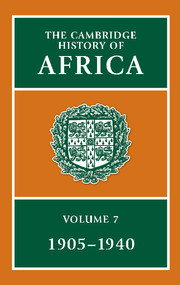Book contents
- Frontmatter
- Introduction
- 1 The imperial mind
- 2 Aspects of economic history
- 3 Christianity
- 4 Islam
- 5 African cross-currents
- 6 The Maghrib
- 7 French black Africa
- 8 British West Africa and Liberia
- 9 Belgian Africa
- 10 Portuguese Africa
- 11 Southern Africa
- 12 British Central Africa
- 13 East Africa
- 14 Ethiopia and the Horn
- 15 Egypt and the Anglo-Egyptian Sudan
- Bibliographical Essays
- Bibliography
- Index
- 10 West Africa from Senegal to Dahomey, 1935
- 13 Belgian Africa, 1939
- References
Introduction
Published online by Cambridge University Press: 28 March 2008
- Frontmatter
- Introduction
- 1 The imperial mind
- 2 Aspects of economic history
- 3 Christianity
- 4 Islam
- 5 African cross-currents
- 6 The Maghrib
- 7 French black Africa
- 8 British West Africa and Liberia
- 9 Belgian Africa
- 10 Portuguese Africa
- 11 Southern Africa
- 12 British Central Africa
- 13 East Africa
- 14 Ethiopia and the Horn
- 15 Egypt and the Anglo-Egyptian Sudan
- Bibliographical Essays
- Bibliography
- Index
- 10 West Africa from Senegal to Dahomey, 1935
- 13 Belgian Africa, 1939
- References
Summary
The period surveyed in this volume spanned the culmination of European power in Africa; it was also a crucial phase in the tutelage of Africans. In 1905 the subjection of Africa to alien rule was almost complete; in the 1940s, opposition to colonial rule gathered pace so fast, both within and outside Africa, that the Second World War can well be regarded as opening a new period. Between these dates, the history of Africa was more obviously being made by Europeans than by Africans. In retrospect, our period might seem to mark a pause between power-struggles, significant mainly as a prelude to Africa's coming-of-age. It is hoped that this volume will reveal more arresting perspectives; it has been written in the belief that the economic, social and cultural changes of the period are intrinsically as important and interesting as any in the history of Africa. Yet it remains true that these changes were due above all to external initiatives which greatly enlarged the fields of action and communication within Africa.
This consideration has determined the plan of this volume. Two-thirds consist of chapters devoted to the history of various regions, and these have been defined in terms of imperial frontiers. For English-speaking and French-speaking Africa such definition is relatively straightforward. The Portuguese territories were widely separated and closely involved with adjacent parts of other empires, but the distinctive nature of Portugal's relationship to Africa makes it analytically useful, as well as convenient, to discuss them within a common framework. Germany, however, lost its colonies in the First World War; they became international mandates, and they are treated in the chapters dealing with adjacent territories under the control of the relevant mandatory power.
- Type
- Chapter
- Information
- The Cambridge History of Africa , pp. 1 - 23Publisher: Cambridge University PressPrint publication year: 1986
References
- 1
- Cited by

